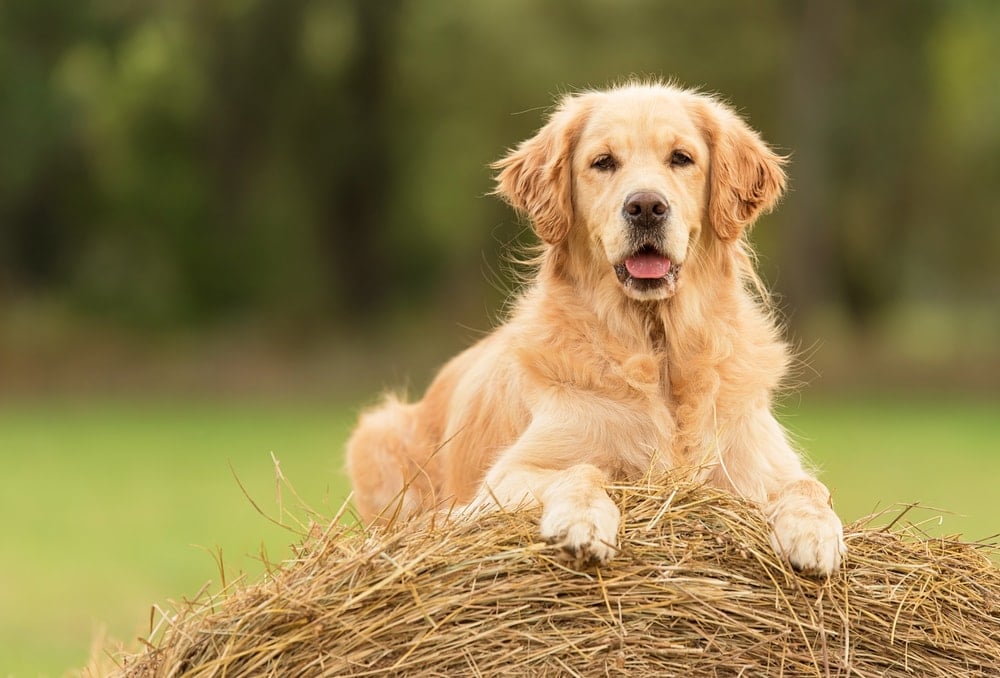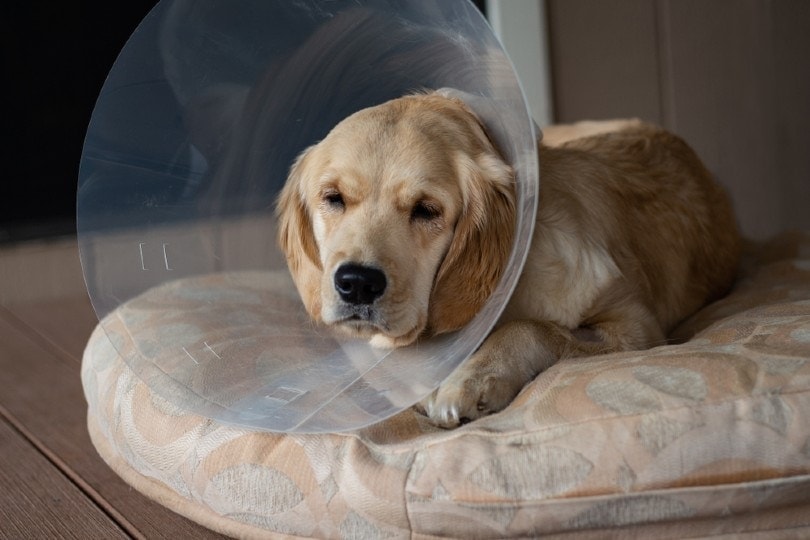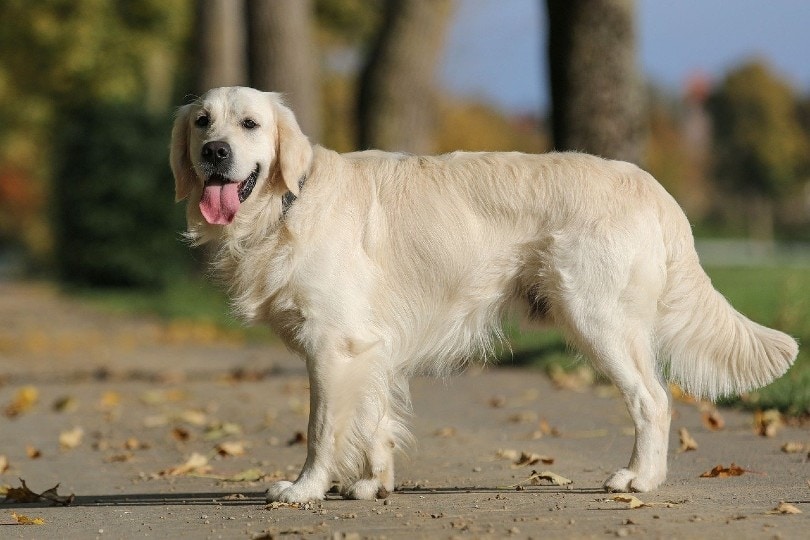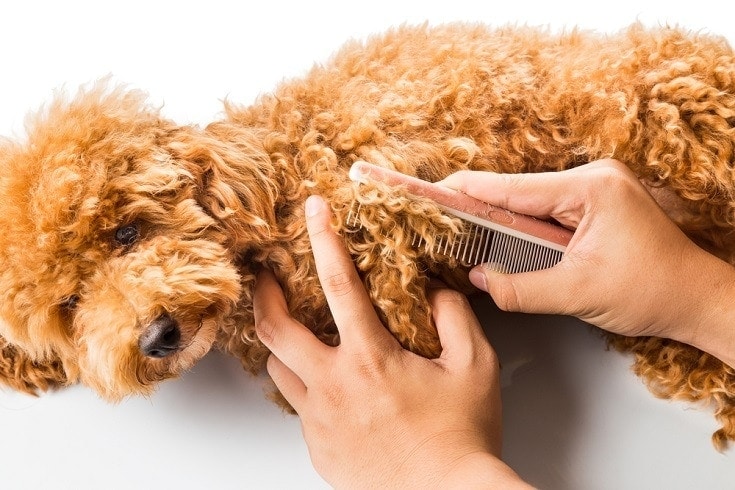Golden Retriever Skin Issues: 7 Common Problems
Updated on

Golden Retrievers don’t need much of an introduction as they have been included in the top five most popular dog breeds in the USA for over a decade. However, beyond all the amazing traits that these dogs have, Goldens do tend to have health issues.
They are especially known to have skin problems, and that’s what we cover here. We go over these issues and what the treatments usually entail so you have a better understanding of your Golden’s health.
The 7 Common Golden Retriever Skin Issues
1. Atopic Dermatitis
Environmental allergies, or atopic dermatitis, are the second most common allergen-based skin disease. They are triggered by allergens such as dust mites in the home, pollens, and mold.
The areas typically affected by atopic dermatitis are the feet, base of the tail, underbelly, groin, armpits, and around the eyes, ears, and muzzle.
- Itching and scratching
- Rubbing against objects
- Licking
- Greasy skin
- Tough skin and redness
- Yeasty smell
Atopic dermatitis is a lifelong condition, and treatment is aimed at controlling the itch and reducing flare-ups. Treatment might involve injections of the allergen that your Golden is sensitive to, which takes up to a year to work but can effectively decrease the itchiness.
There’s also the possibility that your dog will be prescribed oral pills or monthly injections, as well as antifungals or antibiotics.
All these treatments can be used in conjunction with bathing your Golden with a medicated shampoo and diets to support skin health.

2. Bacterial Infections
Bacterial skin infections are known as pyoderma. There are several different kinds of pyoderma, but the common signs are:
- Itchy and red skin
- Patchy hair loss
- Round, crusty sores
- Flakiness of skin
- Visible sores with or without pus
When left untreated, the skin will get thicker and darker, and your dog may experience a loss of appetite, lethargy, and obvious signs of skin discomfort.
Treatment might include topical medications and shampoos, putting an e-cone on to prevent the biting and licking of the affected areas, as well as anti-itch medication and antibiotics.
3. External Parasites
External parasites or ectoparasites are your typical ticks, fleas, and mites. Most medications that tackle these parasites tend to be combined, particularly for fleas and ticks.
When your Golden is infested with parasites, you need to eradicate them not only from your dog but also from your home. This will likely require a great deal of laundering and cleaning to kill off any eggs or larvae.

4. Food Allergies
While food allergies do affect the gastrointestinal tract, many dogs also experience skin issues. In fact, this is one of the most common signs of food allergies.
- Skin lesions from over-scratching
- Persistent itchiness
- Recurring ear infections
Keep in mind that it’s easy to confuse environmental allergies with food allergies, but environmental allergies tend to be seasonal.
Your veterinarian will start by ruling out other potential causes of your Golden’s skin issues. When food allergies are confirmed, a food trial will be recommended. The most common ingredients that dogs can be allergic to are proteins- beef, dairy, and chicken.
Once the source of the allergy is pinpointed, you’ll need to feed your Golden Retriever foods that do not contain the allergen.
5. Foreign Bodies
Sometimes, Golden Retrievers might experience skin issues based on something as simple as objects stuck in the fur. Burrs, twigs, or even gum can get caught in your dog’s coat, which can irritate the skin.
You’ll want to gently remove any objects from your Golden’s fur, though how you remove them depends on what they are. If something is matted up and close to your dog’s skin, you may want to get a professional groomer or vet to remove it without hurting your dog.
Plant seeds can also get stuck in the fur, they then work their way under the skin causing swelling and infection that will need veterinary attention. Be sure to check particularly between the toes after a walk and remove any grass awns before they have a chance to cause trouble.

6. Fungal Infections
Fungal infections can come from something in the environment, from other animals, or just naturally occurring in the dog’s own body. The most common kinds of fungal infections stem from ringworm and yeast infections.
Ringworm is not a worm. It can affect a dog’s skin, coat, and even the nails.
- Itching and excessive scratching
- Crusty and flaky skin
- Inflamed patches of skin
- Hair loss in a circular pattern
- Nails are brittle and sometimes misshapen
Yeast infections aren’t contagious like ringworm, but they affect the dog’s paws, ears, and skin. It’s commonly found in the folds of the skin and on the belly.
- Possible hair loss
- Red, flaky, itchy skin
- Greasy, irritated skin
Treatment might involve anti-fungal shampoos, sprays, wipes, or creams, but in more severe cases, oral antifungal medications might be prescribed.
7. Hot Spots
Golden Retrievers are quite susceptible to hot spots, which are a kind of acute dermatitis. They are caused when irritation occurs and the dog traumatizes the skin with scratching or biting. Bacteria then invade the damaged skin and quickly cause a painful, irritated, and infected patch of skin. Goldens have thick, water-resistant undercoats, and moisture can easily get trapped close to their skin, exacerbating hot spots.
They can appear anywhere on your dog’s skin and might grow larger in just a few days if left untreated. Some small hot spots will clear up on their own, but if the size of one keeps increasing, bleeds, or has discharge, see your vet for treatment.
Treatment involves clipping and cleaning, anti-itch medication, antibiotics, and an e-cone. Depending on why the hot spot occurred, you should groom your Golden after swimming and ensure that your dog’s undercoat isn’t too damp for long periods of time.
Tips on Reducing Skin Issues

There are a few steps that you can take to help reduce the risk of these skin conditions from occurring.
For starters, groom your dog regularly. Goldens should be brushed at least once a week, but more often would be better. You want to keep that undercoat free of mats and as dry as possible.
Grooming frequently also gives you the advantage of spotting any potential problems early on.
If your Golden seems to be scratching more than usual, try an oatmeal bath or pick up an anti-itch shampoo, which can help relieve skin irritation. Just remember to brush and dry your dog well after the bath.
Speak to your vet about potentially changing your dog’s food and adding supplements, such as fatty acids, which can contribute to healthier skin.
Finally, try to keep the house clean, especially your Golden’s bedding. Use cleaning detergents that are pet-friendly since many household cleaners tend to be full of chemicals that can trigger allergies.
Above all else, see your vet. If you wait too long for your vet to look at your dog, the skin condition can potentially worsen and be harder to treat. Checking in with your vet is essential, even if it ends up being a false alarm.
Conclusion
You should now have a much better understanding of the skin problems that might plague your Golden Retriever. All breeds tend to have specific kinds of health conditions that are sometimes genetically inherited, but others occur because of features that the breed has. The Golden Retriever has a coat type that makes them more likely to suffer from a few of the skin issues listed here.
That said, some of these issues can happen to any dog (like ticks and fleas). Just remember to check your Golden’s coat while brushing them weekly, and speak to your vet if you notice something on your dog’s skin that is out of the ordinary.
Featured Image Credit: SasaStock, Shutterstock















